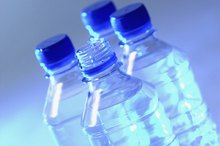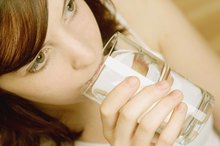What does fact checked mean?
At Healthfully, we strive to deliver objective content that is accurate and up-to-date. Our team periodically reviews articles in order to ensure content quality. The sources cited below consist of evidence from peer-reviewed journals, prominent medical organizations, academic associations, and government data.
The information contained on this site is for informational purposes only, and should not be used as a substitute for the advice of a professional health care provider. Please check with the appropriate physician regarding health questions and concerns. Although we strive to deliver accurate and up-to-date information, no guarantee to that effect is made.
How Much Water Should a 6-Year-Old Boy Drink per Hour?
An adult should aim to drink about 64 ounces of water per day, which translates to about 4 ounces per hour, but a child's need is different. Your 6-year-old son should drink plenty of water during the day, but he needs less than you do 2. Water is a crucial component of your 6-year-old's diet because it supports the functions of his entire body. His water needs depend on his activity level, his health and the temperature outside, and once you know how much he needs per day, you can help him consume adequate amounts each hour.
Importance
Water is critical for survival. Your 6-year-old son needs to drink water each day because the liquid helps flush out toxins and carries nutrients throughout your child's body. Water also enables your son's blood to carry oxygen to all of the parts of his body, helps him digest his food and helps him eliminate waste from his body. The Nemours Foundation's Kids Health website reports that plenty of water is essential for your son's lymph, which is a fluid in his immune system that helps him fight off germs and bacteria that cause illness and disease 1.
- Water is critical for survival.
- Water also enables your son's blood to carry oxygen to all of the parts of his body, helps him digest his food and helps him eliminate waste from his body.
Hourly Need
What Bottled Water Is Safe for Babies?
Learn More
Kids Health notes that your son's water needs will depend on his lifestyle and environment. He will need to drink more water than average if he is active during the day or if he spends time outside in hot weather. The University of Colorado reports that children should drink between 4 and 6 cups of water each day 4. This translates to between 32 and 48 ounces on a daily basis. Translated to hours, your 6-year-old should be drinking between 2.5 and 3.5 ounces of water each hour, or about 1/2 to 3/4 of a cup.
- Kids Health notes that your son's water needs will depend on his lifestyle and environment.
- Translated to hours, your 6-year-old should be drinking between 2.5 and 3.5 ounces of water each hour, or about 1/2 to 3/4 of a cup.
Recommendations
While all liquids help hydrate your 6-year-old son's body, certain beverages are more nutritious than others. Plain, unflavored and unsweetened water is the best beverage to offer your child because it meets all of his bodily needs without adding calories or sugar to his diet. Kids Health notes that milk will help your child meet his liquid needs, as well. Restrict your 6-year-old son's intake of soda, fruit juice and flavored water. Encourage your 6-year-old to consume the 2.5 to 3.5 ounces of water he needs each hour by sending a water bottle to school with him, encouraging him to drink water with each meal and by offering fruits and vegetables, which contain water and can help him reach this goal.
- While all liquids help hydrate your 6-year-old son's body, certain beverages are more nutritious than others.
- Plain, unflavored and unsweetened water is the best beverage to offer your child because it meets all of his bodily needs without adding calories or sugar to his diet.
Cautions
My Infant Gets a Fever After Shots
Learn More
If your son does not get the 2.5 to 3.5 ounces of water he needs per hour, he may begin to become dehydrated, which can cause:
- lethargy
- difficulty concentrating
- headache
- dizziness
- nausea
If these symptoms occur, offer your child water, and call his doctor immediately. Increase his water intake if the weather is hot or if he is playing vigorous sports activities. You will know he is getting enough water in these circumstances if his urine is pale yellow or colorless. If his urine is dark yellow, it is a good indication that he needs to drink more water.
- If your son does not get the 2.5 to 3.5 ounces of water he needs per hour, he may begin to become dehydrated, which can cause: * lethargy
* difficulty concentrating
* headache
* dizziness
* nausea If these symptoms occur, offer your child water, and call his doctor immediately. - You will know he is getting enough water in these circumstances if his urine is pale yellow or colorless.
Related Articles
References
- Kids Health: Why Drinking Water is the Way to Go
- MayoClinic.com: Water: How Much Should You Drink Every Day?
- Baby Center: How Can I Get My Child To Drink More Water?
- Colorado State University Extension: How Much Water Should I Drink A Day?
- Ohashi Y, Sakai K, Hase H, Joki N. Dry weight targeting: The art and science of conventional hemodialysis. Semin Dial. 2018;31(6):551-556. doi:10.1111/sdi.12721
- Beverages, water, tap, drinking. FoodData Central. U.S. Department of Agriculture. Published April 1, 2019.
- Dietary reference intakes for water, potassium, sodium, chloride, and sulfate. National Academies Press, 2005.
- Jéquier E, Constant F. Water as an essential nutrient: The physiological basis of hydration. Eur J Clin Nutr. 2010;64(2):115-23. doi:10.1038/ejcn.2009.111
- Popkin BM, D'Anci KE, Rosenberg IH. Water, hydration, and health. Nutr Rev. 2010;68(8):439-4358. doi:10.1111/j.1753-4887.2010.00304.x
- Adan A. Cognitive performance and dehydration. J Am Coll Nutr. 2012;31(2):71-8. doi:10.1080/07315724.2012.10720011
- Dennis EA, Dengo AL, Comber DL, et al. Water consumption increases weight loss during a hypocaloric diet intervention in middle-aged and older adults. Obesity (Silver Spring). 2010;18(2):300-307. doi:10.1038/oby.2009.235
- National Institutes of Health Genetic and Rare Diseases Information Center. Aquagenic urticaria. Updated June 20, 2016.
- Centers for Disease Control and Prevention. Well testing. Updated April 10, 2009.
Writer Bio
Sara Ipatenco has taught writing, health and nutrition. She started writing in 2007 and has been published in Teaching Tolerance magazine. Ipatenco holds a bachelor's degree and a master's degree in education, both from the University of Denver.









